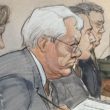Post-DeLay Disarray—Tom DeLay is out, but the race in Texas to replace him has only just begun. There are more possible successors than there are indicted DeLay aides. The list of candidates includes a local county judge; the mayor of Sugar Land, Texas; a state representative and a state senator; a tax assessor; and a lawyer who finished second to DeLay in the March primary. The district’s four GOP precinct chairs will select the eventual nominee, who’ll face a libertarian candidate, former Republican-turned-Independent Steve Stockman (nicknamed “Congressman Clueless” when he served one term in the House) and Democrat Nick Lampson, who defeated Stockman in 1996 before getting redistricted out of Congress by none other than Tom DeLay.
Texas governor Rick Perry, once he receives DeLay’s official resignation, could call a special election within 20 days to fill DeLay’s seatthe option advocated by Lampson and a handful of his wanna-be Republican opponents. But thus far Perry has said the election will take place as scheduled on November 7. “Our seat in Congress should not be empty while Tom DeLay tries to manipulate who his successor will be,” says Lampson. “We need to avoid any appearance of selection by back-room bargain,” adds GOP lawyer Tom Campbell. Even with DeLay gone, DeLayism lives on.
Let Them Pick Fruit—When he was elected to the Colorado Statehouse in 1976, Tom Tancredo joined a group of legislators, known as “the crazies,” who wanted to eliminate the sales tax and public schools. This grandson of Italian immigrants has since gained a national following by bashing illegal immigration.
The Republican congressman from suburban Denver, who represents the district with the smallest share of Hispanic residents in Colorado, has rallied with the Minutemen vigilantes at the U.S.–Mexico border, appeared over 1,000 times on talk radio and emerged as a dark horse candidate for his party’s 2008 presidential nomination. He helped pass a House bill in December that would make being an undocumented immigrant “an aggravated felony” and would construct a $2.2 billion wall along the 700-mile Mexico border. “They need to be found before it is too late,” Tancredo once said of his round-’em-up approach. “They’re coming here to kill you, and you, and me, and my grandchildren.” Threats like these have made Tancredo a darling of the far right and an enemy of businesses who need inexpensive workers, as well as Republican strategists who hope to woo Hispanics, including Karl Rove. Weekly Standard editor Bill Kristol nicknamed Tancredo’s Immigration Reform Caucus the “House Caucus to Return the Party to Minority Status.”
Tancredo reacted furiously to a tentative Senate compromise that would provide a path to citizenship for a large majority of the 11 million illegal immigrants in the U.S., labeling it “miserable public policy.” When the bill fell apart hours later, amid objections by conservative Republicans and liberal Democrats, Tancredo hailed its demise, vowing to “inform the Senators’ constituents of what their representatives are doing in Washington.” In the thick of the immigration fight, the pro-business Wall Street Journal editorial page wondered, “Will GOP Be the Party of Reagan or Tom Tancredo?” The question itself was telling. If Republicans choose Tancredo, the 44 percent of Hispanic voters who voted for Bush in 2004 could vanish overnight.
Elections Without Voters—Elections are set to take place in New Orleans on April 22. But who’ll actually vote in them is another, hotly contested matter. Hurricane Katrina displaced between 45 and 65 percent of the city’s 300,000 registered voters. A significant majority now reside outside Louisiana. Under current election rules, upheld recently by a District Court judge, these residents, scattered across all fifty states and Puerto Rico, will need to return to Louisiana to vote or cast ballots by mail. When the lieutenant governor of Utah offered to set up satellite polling stations for evacuees, Louisiana officials turned him down.
Civil rights groups say the ruling will disenfranchise thousands of primarily African-American voters. They want election officials to set up satellite polling places outside the city, postpone the vote, or both. Jesse Jackson held protests in Southern cities to highlight the issue. Meanwhile, low African-American turnout could help Lieutenant Governor Mitch Landrieu (brother of Senator Mary and son of former mayor Moon) become the Big Easy’s first white mayor since 1978.



0 Comments